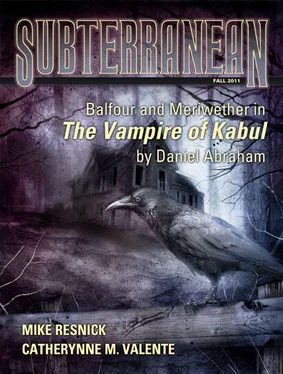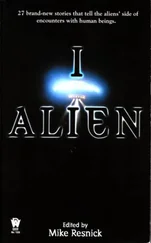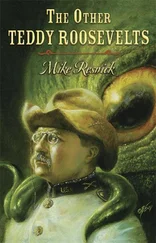Mike Resnick - Shaka II
Здесь есть возможность читать онлайн «Mike Resnick - Shaka II» весь текст электронной книги совершенно бесплатно (целиком полную версию без сокращений). В некоторых случаях можно слушать аудио, скачать через торрент в формате fb2 и присутствует краткое содержание. Год выпуска: 2011, Издательство: Subterranean Press, Жанр: Фантастика и фэнтези, на английском языке. Описание произведения, (предисловие) а так же отзывы посетителей доступны на портале библиотеки ЛибКат.
- Название:Shaka II
- Автор:
- Издательство:Subterranean Press
- Жанр:
- Год:2011
- ISBN:нет данных
- Рейтинг книги:3 / 5. Голосов: 1
-
Избранное:Добавить в избранное
- Отзывы:
-
Ваша оценка:
- 60
- 1
- 2
- 3
- 4
- 5
Shaka II: краткое содержание, описание и аннотация
Предлагаем к чтению аннотацию, описание, краткое содержание или предисловие (зависит от того, что написал сам автор книги «Shaka II»). Если вы не нашли необходимую информацию о книге — напишите в комментариях, мы постараемся отыскать её.
Shaka II — читать онлайн бесплатно полную книгу (весь текст) целиком
Ниже представлен текст книги, разбитый по страницам. Система сохранения места последней прочитанной страницы, позволяет с удобством читать онлайн бесплатно книгу «Shaka II», без необходимости каждый раз заново искать на чём Вы остановились. Поставьте закладку, и сможете в любой момент перейти на страницу, на которой закончили чтение.
Интервал:
Закладка:
I still remember the first time she missed. We were inspecting a new barracks just outside the town of Bhebhe on the new colony world of Dingiswayo. As we reached the end of the building, Tchaka produced a small lizard, no more than six inches in length except for the tail, and flipped it in the air. Nandi’s tongue shot out—and she missed it by a good two inches.
I laughed, but cut my laughter short when Tchaka glared furiously at me. He picked Nandi up and cradled her body in his arms, a worried expression on his face.
“She must be ill,” he said.
“Everyone’s allowed to miss once in a while,” I said. “Even her. Even you.”
“No,” he said. “She is perfection. If she missed, something has to be wrong with her.”
“I suppose we can take her to a veterinarian,” I suggested.
“Our veterinarians can only treat mutated cattle,” he said. “None of them has ever examined a member of Nandi’s species. I do not think it even has a name.” He put her down on the ground and walked a few feet away. She followed him, but she didn’t have the usual spring to her step. “This inspection is ended. We’re going back to Cetshwayo.”
And twenty minutes later our ship took off.
I didn’t think there was anything seriously wrong with Nandi. I thought that she may have had a mild stomach ache, or perhaps the atmosphere or gravity on Dingiswayo was not quite what she was used to, but I assumed she’d be fine again in another day or two.
Once we landed, Tchaka took her back to his office, where she spent most of her time, in the hope that familiar surroundings would somehow cure whatever ailed her. She didn’t get any worse, but she didn’t get any better. He sent half a dozen men out to find the tastiest lizards and bring them back, he collected piles of silks and made beds in every corner of the office, but she preferred sleeping on his desk, as she always had.
The next day he tossed a couple of lizards in her direction, and she totally ignored them.
He turned to his assembled aides. “Out!” he commanded. “She needs rest, not distractions.”
“But Tchaka, we have an empire to run, business to transact,” said one of them.
I thought he might kill the man on the spot, but he was so concerned with Nandi that he merely pointed to the door, and one by one we filed out.
I had been with him longer than anyone. I had never seen him show sympathy or concern for a friend, for a sibling, for anyone or anything—until now. I was the last to leave the office, and as I turned back I saw him holding this alien creature more tenderly, more lovingly, than any human parent has ever held a baby.
“It is sick,” an aide whispered to me as we walked down the long hallway. “An entire empire’s business is on hold because a totally worthless pet may or may not have a stomach ache.”
“It shows he is a leader with great compassion,” said another.
“And when we walk out the front door,” said the first aide, “you will pass a hundred examples of his compassion.”
“They were enemies of the state,” said the second.
“And is that ugly thing a friend of the state?”
“She is a friend of Tchaka’s,” I said. “His only friend. I would be very careful what I said of her.” I was going to add the old adage about the walls having ears, but he looked at me with such sudden terror in his eyes that I realized he was thinking only of my ears—and my mouth.
“I did not mean—” he began quickly.
“It’s all right,” I said. “I’m a brother, not an informant.”
He thanked me, but he also managed to get out of my presence as quickly as he could.
I went to a local restaurant, and while I was seated at a table, waiting to be served, I was joined by Peter Zondo.
“Is what I heard true?” he asked.
“Probably,” I said. “But suppose you tell me what you heard anyway?”
“The Princess—or is she the Empress?—didn’t eat her breakfast, and the universe has come to a stop.”
I was about to tell him not to be so sarcastic—but then I realized that he had properly assessed the situation, at least in regard to our, universe.
“It is true,” I said at last.
“Ten thousand women throw themselves at him, and he saves his affection for that,” he continued contemptuously. “The man is sicker than his pet.”
“What do you want me to say?” I replied irritably. “That at least he cares for something?”
“You know what I want you to say—and to do,” said Peter.
“What do you think will happen if someone—not me, but someone—killed him?” I asked.
“We would be free of a tyrant,” he said, puzzled by my question.
“How do you know that the man who killed him, the man who could kill him, would not be an even greater tyrant?”
“There are no greater tyrants!” said Peter passionately.
“There have been,” I said. “Caligula, Stalin—”
“And Rome and Russia and Brazil and New Zealand all survived them!” he interrupted.
“Keep your voice down,” I cautioned him.
“You see?” he said. “We are his brothers, his most trusted advisors—and we dare not speak our minds in public.”
“You are welcome to speak your mind,” I said, becoming annoyed with him. “Just don’t speak it at my table.”
He held his hands up, as if to cut off the conversation. He lowered his head in thought for a moment, and finally looked up at me. “If you will not do what we have discussed in the past, will you at least consider one other thing?”
“Probably not,” I said.
“Do you not even wish to know what it is?”
“You’re going to tell me whether I ask or not.”
He leaned forward and lowered his voice until no one else could hear it. “Kill Nandi,” he hissed.
I just stared at him.
“Maybe it will bring him to his senses,” he continued.
“You mean the way he was before he found Nandi?” I replied sardonically.
He got to his feet. “You are hopeless,” he said contemptuously, and walked out of the restaurant without another word.
Late that night I found myself too restless to sleep, so I decided to take a walk. Eventually I wound up in front of the Royal Palace, and I could see the light on in Tchaka’s suite of rooms. He had never had any trouble sleeping, and I knew he was sitting up with Nandi, trying to make her comfortable.
I should have kept walking or returned home, but instead I remained looking up at his room for another ten minutes. Then, just as I was about to finally leave, the night air was broken by the most agonized, heartbroken scream I have ever heard in my life.
It did not come from Nandi.
Well, at least that’s over with, I thought.
But I was wrong. It was just beginning.
19.
Nandi was given a royal funeral with full military honors. British monarchs never received a more formal send-off. She was wrapped in the flag that bore her likeness, then placed in a small golden casket, which was carried to her tomb—an indoor mausoleum in one corner of Tchaka’s office—by four large soldiers.
But before she was brought to her final resting place, Tchaka announced that he would speak at the funeral. There were perhaps five thousand people in attendance, most of them doubtless feeling slightly ridiculous, as I myself did. I kept wondering what he was going to say, for the Zulus do not speak over their dead.
Finally he stepped forward, and all eyes turned to him.
“Cetshwayo has lost its queen, and the Zulu Empire has lost its empress,” he said, and I was struck by the fact that no one dared to even smile, let alone laugh. “This is the greatest tragedy to befall us since we left the Earth,” he continued, “and I hereby declare a mourning period to last until one year from today. This period will be observed on every planet and by every citizen of the Empire, no matter how far-flung.”
Читать дальшеИнтервал:
Закладка:
Похожие книги на «Shaka II»
Представляем Вашему вниманию похожие книги на «Shaka II» списком для выбора. Мы отобрали схожую по названию и смыслу литературу в надежде предоставить читателям больше вариантов отыскать новые, интересные, ещё непрочитанные произведения.
Обсуждение, отзывы о книге «Shaka II» и просто собственные мнения читателей. Оставьте ваши комментарии, напишите, что Вы думаете о произведении, его смысле или главных героях. Укажите что конкретно понравилось, а что нет, и почему Вы так считаете.












